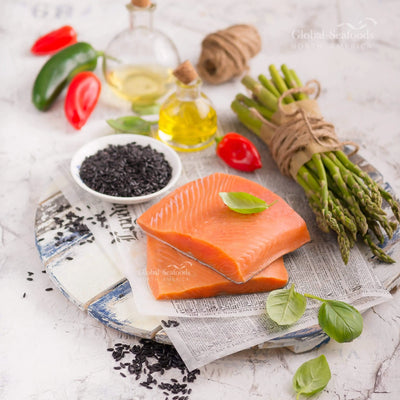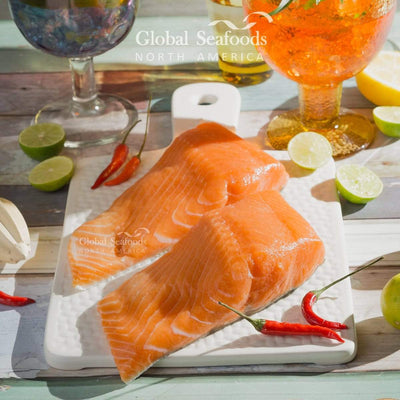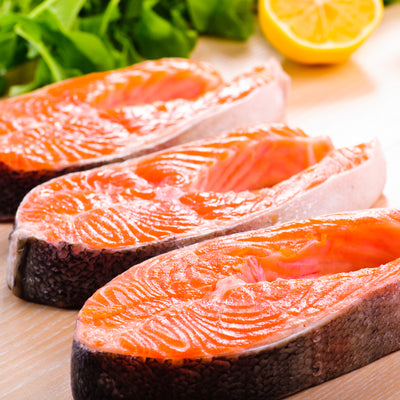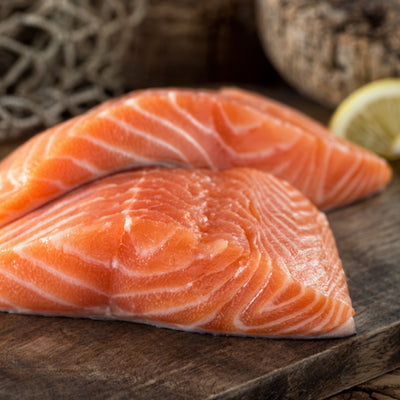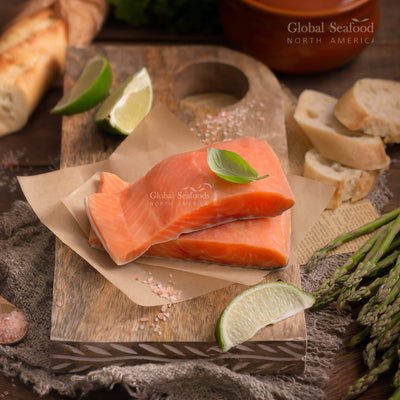The Health Benefits of Fat from Wild Salmon: A Nutritional Powerhouse

The Health Benefits of Fat from Wild Salmon: A Nutritional Powerhouse
When it comes to superfoods, wild salmon stands out as a top contender. Packed with essential nutrients, including heart-healthy omega-3 fatty acids, wild salmon fat plays a crucial role in supporting overall wellness. From boosting brain function to reducing inflammation, the fat in wild salmon provides numerous health benefits that make it a must-have in any balanced diet.
In this article, we’ll explore why the fat from wild salmon is beneficial, how it compares to other fats, and the best ways to enjoy it for maximum nutritional value.
Why Is Wild Salmon Fat So Healthy?
The fat in wild salmon is primarily composed of omega-3 fatty acids, particularly EPA (eicosapentaenoic acid) and DHA (docosahexaenoic acid). These essential fats cannot be produced by the human body and must be obtained from food. They play a critical role in:
- Heart health – Omega-3s reduce inflammation, lower triglycerides, and support cardiovascular function.
- Brain function – DHA is vital for cognitive performance, memory retention, and reducing the risk of neurodegenerative diseases.
- Joint and muscle health – Omega-3s help decrease inflammation, easing symptoms of arthritis and improving recovery after exercise.
- Skin and hair health – The healthy fats in wild salmon contribute to glowing skin and stronger hair.
- Immune support – The anti-inflammatory properties of omega-3s strengthen the immune system and help fight off infections.
Comparing Wild Salmon Fat to Other Fats
Not all fats are created equal. Here’s how wild salmon fat compares to other dietary fats:
| Fat Source | Type of Fat | Health Benefits |
|---|---|---|
| Wild Salmon | Omega-3 (EPA, DHA) | Supports heart, brain, and joint health |
| Olive Oil | Monounsaturated Fat | Good for heart health, rich in antioxidants |
| Avocados | Monounsaturated Fat | Supports skin health and reduces inflammation |
| Butter | Saturated Fat | Should be consumed in moderation |
| Processed Oils | Trans Fat | Increases cholesterol, harmful to heart health |
Wild salmon fat is among the best sources of healthy fats, surpassing even popular plant-based sources like olive oil and avocados when it comes to omega-3 content.
Best Types of Wild Salmon for Healthy Fat Intake
When choosing salmon for its fat content, wild-caught varieties are the best choice. Here are the top types of wild salmon known for their nutrient-rich fat:
1. King (Chinook) Salmon
- Highest in omega-3 fatty acids
- Rich, buttery texture
- Ideal for grilling or baking
2. Sockeye Salmon
- Deep red color due to high astaxanthin content (a powerful antioxidant)
- Lower fat than King salmon but still packed with nutrients
- Best for roasting, searing, or enjoying raw as sushi
3. Coho (Silver) Salmon
- Milder flavor, moderate fat content
- Great for those who prefer a lighter taste
- Works well in pasta dishes and salads
4. Pink Salmon
- Lower in fat but still a good source of omega-3s
- Often used for canned salmon and fish patties
5. Chum Salmon
- Mild flavor and moderate fat content
- Frequently used for making salmon roe (caviar)
For maximum health benefits, opt for wild-caught salmon rather than farmed varieties. Wild salmon contains more omega-3s and fewer contaminants than farmed salmon.
Best Ways to Cook and Enjoy Wild Salmon Fat
1. Grilled Wild Salmon
- Enhances natural flavor
- Locks in omega-3s without excess oil
- Pair with lemon and herbs for a refreshing taste
2. Baked Salmon with Garlic Butter
- Baking preserves the healthy fats
- Garlic and butter enhance the taste while maintaining nutritional value
3. Pan-Seared Salmon
- Creates a crispy, flavorful crust while keeping the inside tender
- Cook with olive oil for extra heart-healthy benefits
4. Smoked Wild Salmon
- A great option for salads, sandwiches, or appetizers
- Retains most of its omega-3 content
5. Salmon Roe (Ikura)
- One of the richest sources of omega-3s
- Perfect for sushi, toast, or as a garnish
How Much Salmon Fat Should You Eat?
Health experts recommend consuming at least two servings of wild salmon per week to meet your omega-3 needs. A 3.5-ounce serving of wild salmon provides about 1.5 to 2 grams of omega-3 fatty acids, which is more than enough to support heart, brain, and overall health.
For those looking to increase their omega-3 intake, salmon belly strips and salmon roe are excellent options, as they contain even higher concentrations of healthy fats.
FAQs About Wild Salmon Fat
1. Is wild salmon fat better than farmed salmon fat?
Yes, wild salmon has more omega-3s and fewer toxins than farmed salmon, making it the healthier choice.
2. Can eating wild salmon fat help with weight loss?
Yes, omega-3s in salmon help regulate metabolism and reduce inflammation, aiding in weight management.
3. Is it safe to eat salmon fat every day?
While wild salmon is highly nutritious, it’s best to eat it 2-3 times per week to maintain a balanced diet.
4. Does cooking salmon reduce its healthy fat content?
Cooking methods like grilling, baking, and pan-searing preserve omega-3s, while deep frying can degrade some of the healthy fats.
5. What’s the best way to store wild salmon?
Store fresh salmon in the fridge for up to 2 days or freeze it for up to 3 months for long-term storage.
Conclusion
Fat from wild salmon is one of the best sources of omega-3 fatty acids, offering numerous health benefits for your heart, brain, and overall well-being. By choosing wild-caught varieties and using healthy cooking methods, you can maximize its nutritional value and enjoy a delicious, nutrient-rich meal.
Start incorporating wild salmon into your diet today to experience its incredible health benefits!
Where to Buy High-Quality Wild Salmon?
Looking for premium wild salmon packed with omega-3 goodness? Check out these high-quality selections:
🔗 Sockeye Salmon Fillets
🔗 King Salmon – The Omega-3 Powerhouse
🔗 Coho Salmon Fillet Portions
🔗 Salmon Belly Strips – Extra Fatty & Delicious
🔗 Chum Salmon – Rich in Nutrients
🔗 Copper River King Salmon
🔗 Silver Salmon – A Versatile Option
🎥 Watch expert tips & salmon recipes on Global Seafoods YouTube Channel.
By choosing wild salmon, you're supporting sustainable fishing practices while giving your body the best possible nutrition. Enjoy the benefits of wild salmon fat and make it a staple in your diet today! 🐟💙
Also in News

How to Make Sea Bream Sushi With Dry-Aged Tuna & Crab Roll — Step-by-Step With Chef Joshua
A complete guide to making Sea Bream sushi at home, including filleting, curing, slicing, and building a Dry-Aged Tuna & Crab sushi roll. Chef Joshua shares professional tips for restaurant-quality results.

Cooked Crab for Game Night: Everything You Need for a Perfect Seafood Party
Take your game night to the next level with a Cooked crab party. Learn the best recipes, cooking tips, and hosting hacks for a memorable seafood feast.

Steam Crab for Date Night: A Romantic Guide to the Perfect Seafood Feast
Make your next date night unforgettable with a romantic Steam crab experience. This guide covers everything you need to know, from ambiance to the best crab varieties.


